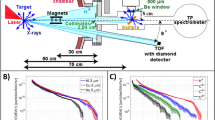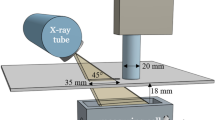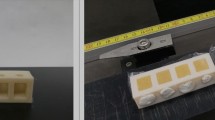Abstract
THE analysis of trace elements in concentrations of a few parts per million, or less, by X-ray fluorescence spectrography has hitherto not been practicable, mainly as a result of the relative weakness of the emitted spectra. Grubb and Zemany1 have obviated this difficulty by showing that traces of cobalt at levels of 1 µgm./l. may be analysed by first adsorbing the element on to a small piece of cation membrane and irradiating this in an X-ray spectrograph. The long equilibration times involved (16–48 hr.) have, however, precluded the general application of their method in a wider field, particularly in process control, where the time-factor is important.
This is a preview of subscription content, access via your institution
Access options
Subscribe to this journal
Receive 51 print issues and online access
$199.00 per year
only $3.90 per issue
Buy this article
- Purchase on Springer Link
- Instant access to full article PDF
Prices may be subject to local taxes which are calculated during checkout
Similar content being viewed by others
References
Grubb, W. T., and Zemany, P. D., Nature, 176, 221 (1955).
Van Niekerk, J. N., and Wybenga, F. T., J. App. Spectr. (in the press).
Author information
Authors and Affiliations
Rights and permissions
About this article
Cite this article
VAN NIEKERK, J., DE WET, J. Trace Analysis by X-Ray Fluorescence using Ion Exchange Resins. Nature 186, 380–381 (1960). https://doi.org/10.1038/186380a0
Issue Date:
DOI: https://doi.org/10.1038/186380a0
This article is cited by
-
Die R�ntgenfluorescenzanalyse zur Bestimmung von Spurenelementen in der Lebensmittelchemie
Zeitschrift f�r Lebensmittel-Untersuchung und -Forschung (1974)
-
Anwendung der R�ntgenfluoreszenz in der Spurenanalyse
Mikrochimica Acta (1965)
-
Untersuchungen zur quantitativen Auswertung von Papierchromatogrammen in der Spurenanalyse durch Röntgenfluorescenzspektroskopie
Fresenius' Zeitschrift für analytische Chemie (1961)
Comments
By submitting a comment you agree to abide by our Terms and Community Guidelines. If you find something abusive or that does not comply with our terms or guidelines please flag it as inappropriate.



